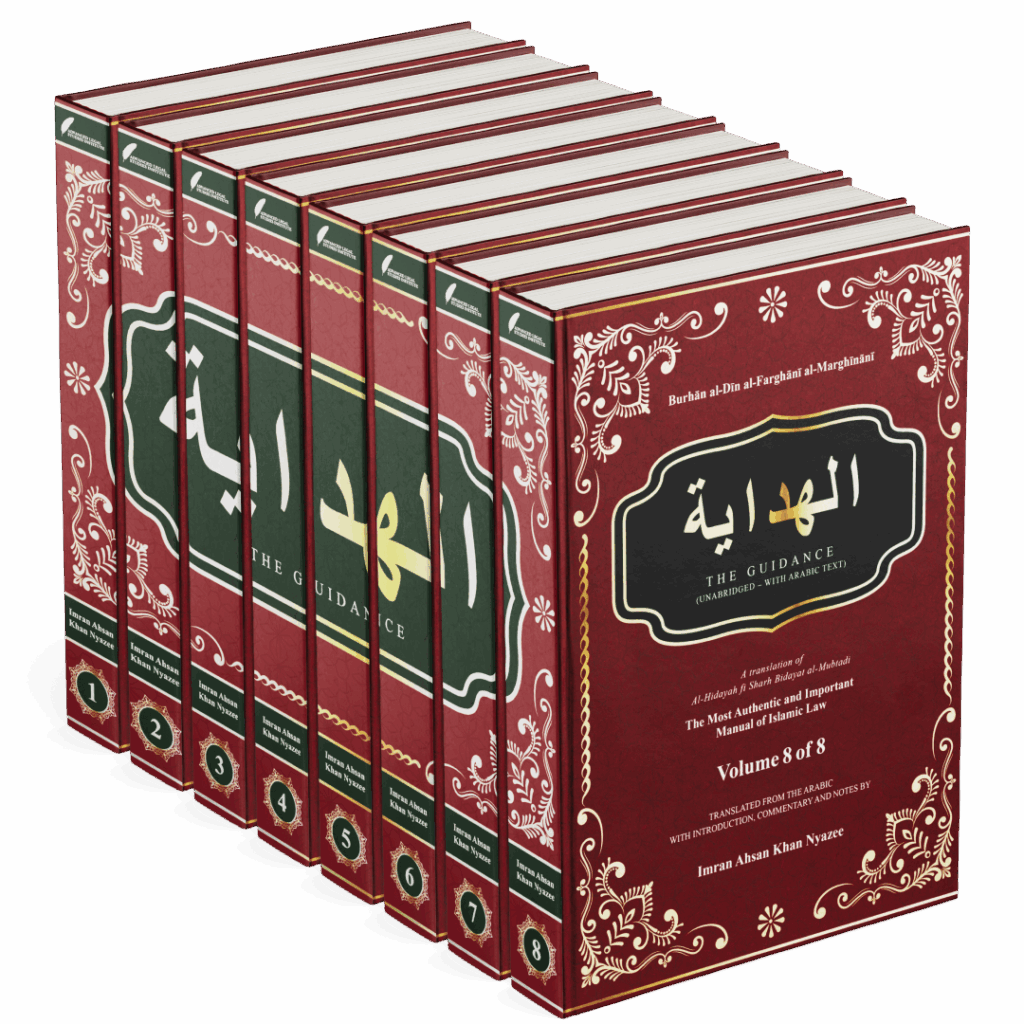
Al-Hidayah: The Guidance Hardbound (8 Book Series)
- by Burhan al-Din al-Farghani al-Marghinani (Author), Imran Ahsan Khan Nyazee (Translator)
The Guidance by al-Marghīnānī, this hardbound eight-volume edition, modeled on Allamah al-Lakhnawī’s celebrated set, presents the original Arabic text alongside a clear English translation and comprehensive index. Covering purification, prayer, zakat, fasting, hajj, family law, transactions, and criminal law, it serves as a complete reference for scholars and students of the Hanafi legal tradition.
Complete Books Series
Buy on Amazon
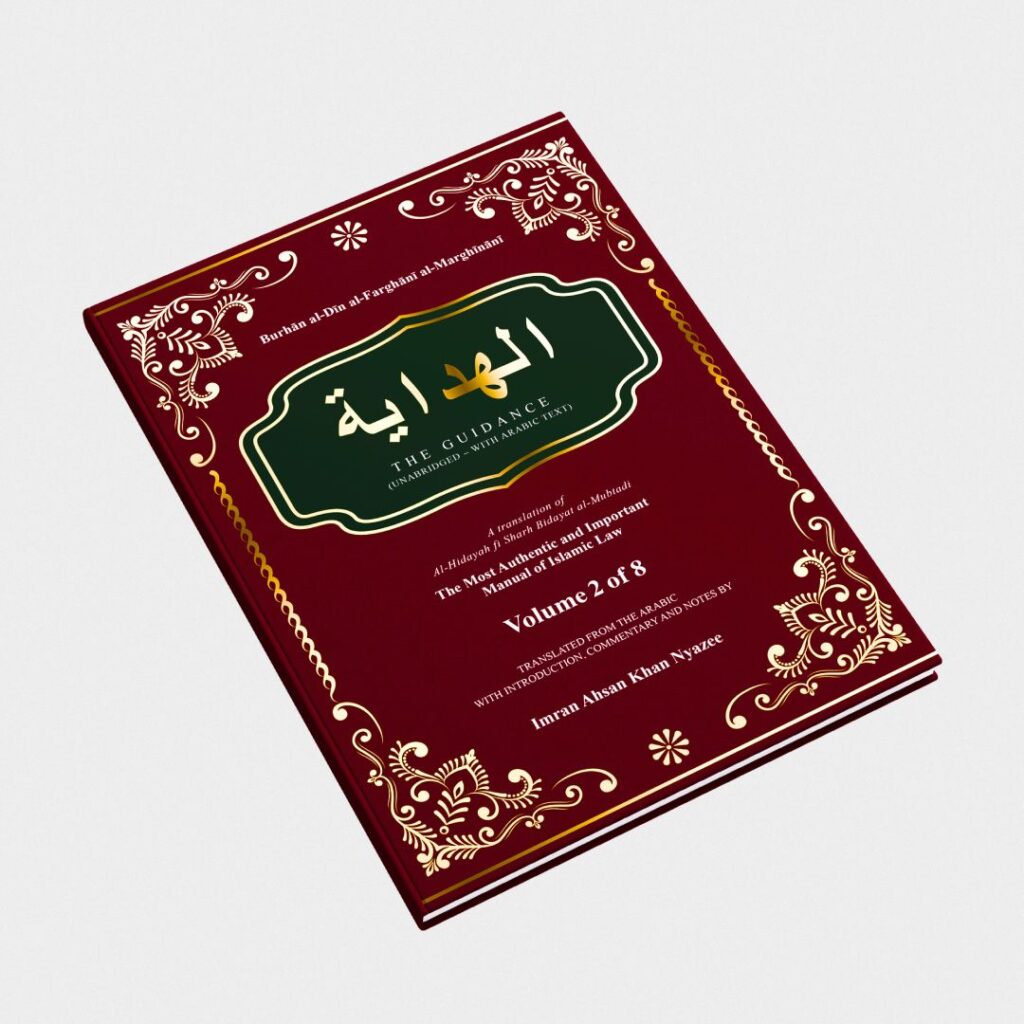
Al-Hidayah: The Guidance Hardbound Volume 1 (8 Book Series)
- by Burhan al-Din al-Farghani al-Marghinani (Author), Imran Ahsan Khan Nyazee (Translator)

Al-Hidayah: The Guidance Hardbound Volume 2 (8 Book Series)
- by Burhan al-Din al-Farghani al-Marghinani (Author), Imran Ahsan Khan Nyazee (Translator)
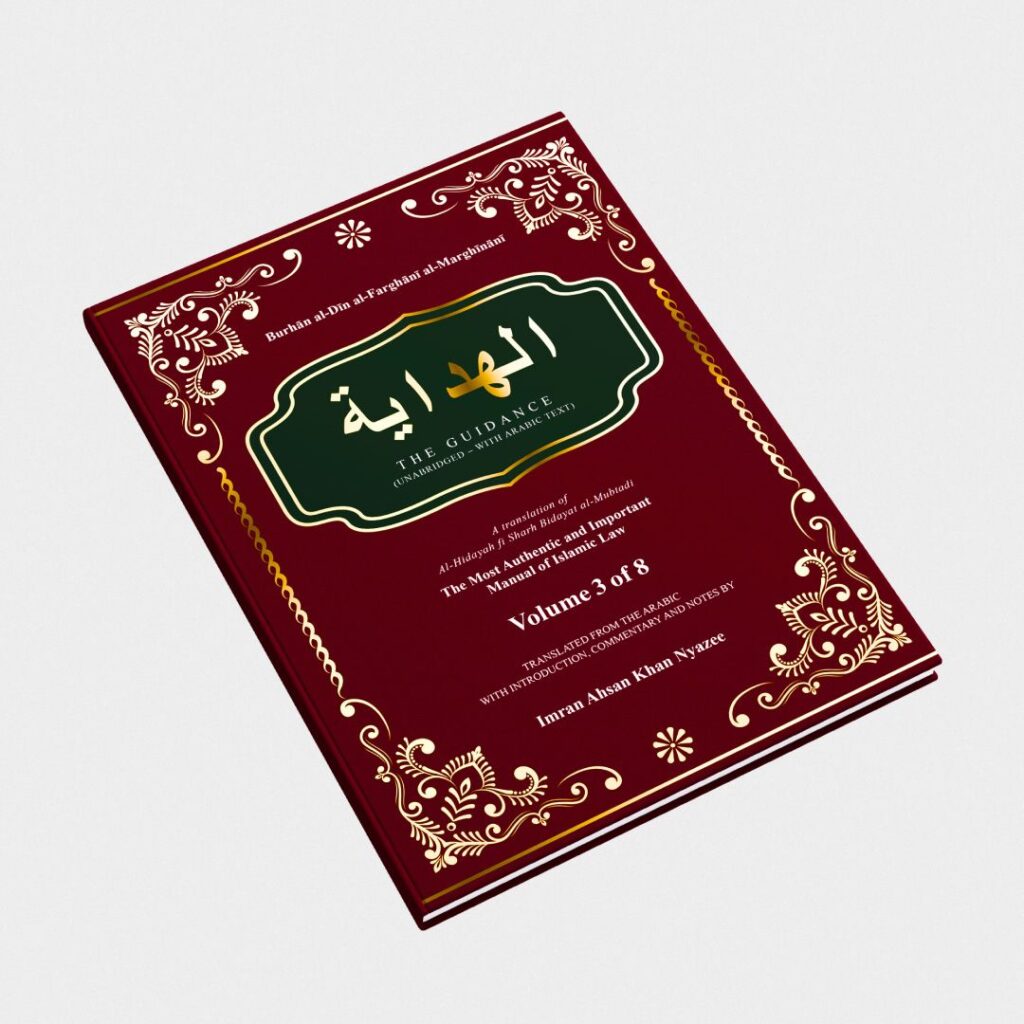
Al-Hidayah: The Guidance Hardbound Volume 3 (8 Book Series)
- by Burhan al-Din al-Farghani al-Marghinani (Author), Imran Ahsan Khan Nyazee (Translator)
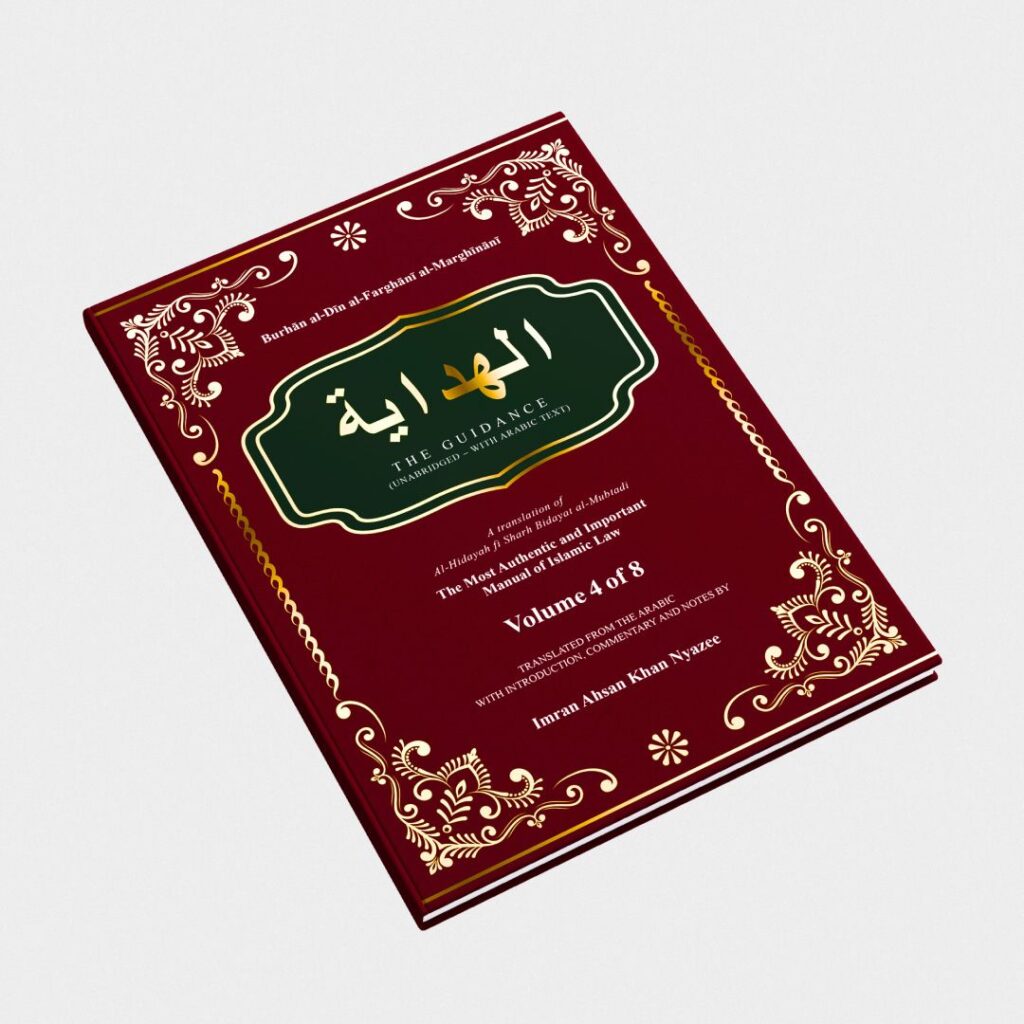
Al-Hidayah: The Guidance Hardbound Volume 4 (8 Book Series)
- by Burhan al-Din al-Farghani al-Marghinani (Author), Imran Ahsan Khan Nyazee (Translator)
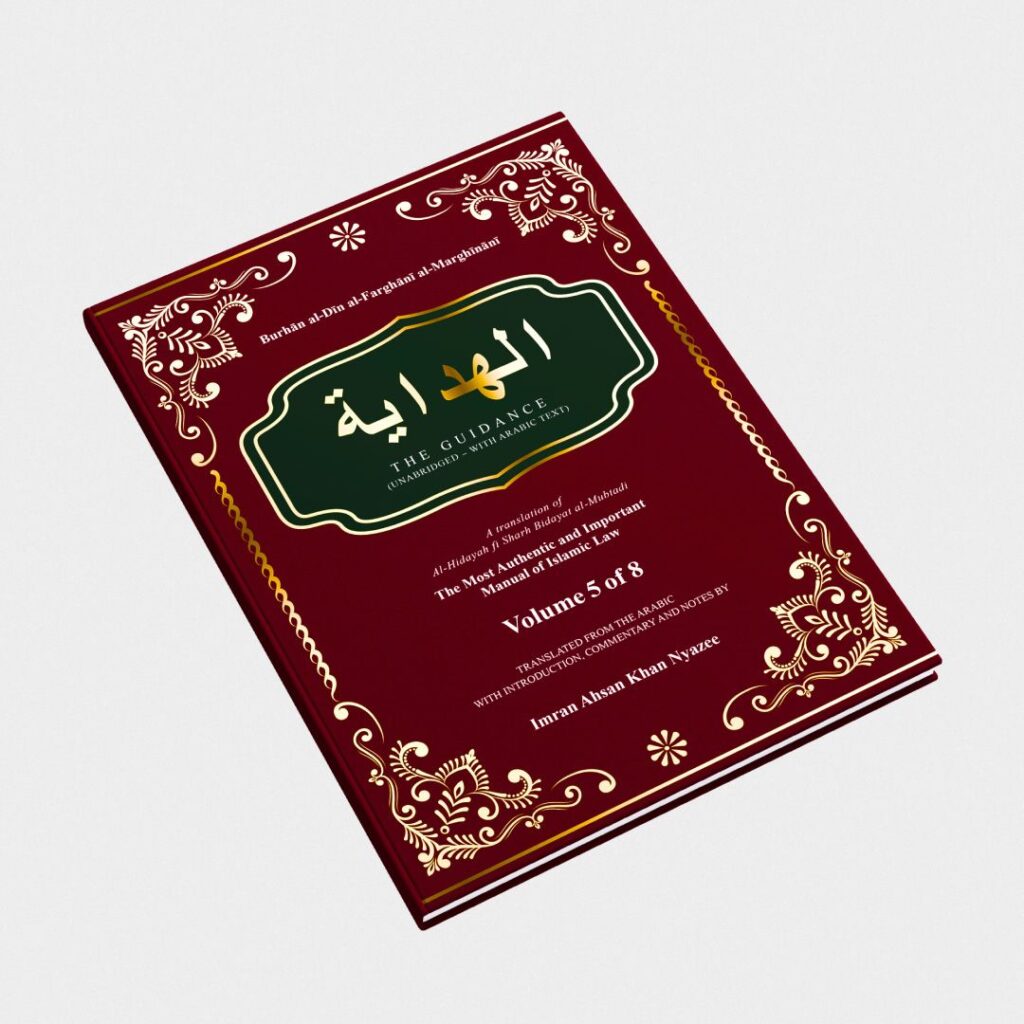
Al-Hidayah: The Guidance Hardbound Volume 5 (8 Book Series)
- by Burhan al-Din al-Farghani al-Marghinani (Author), Imran Ahsan Khan Nyazee (Translator)
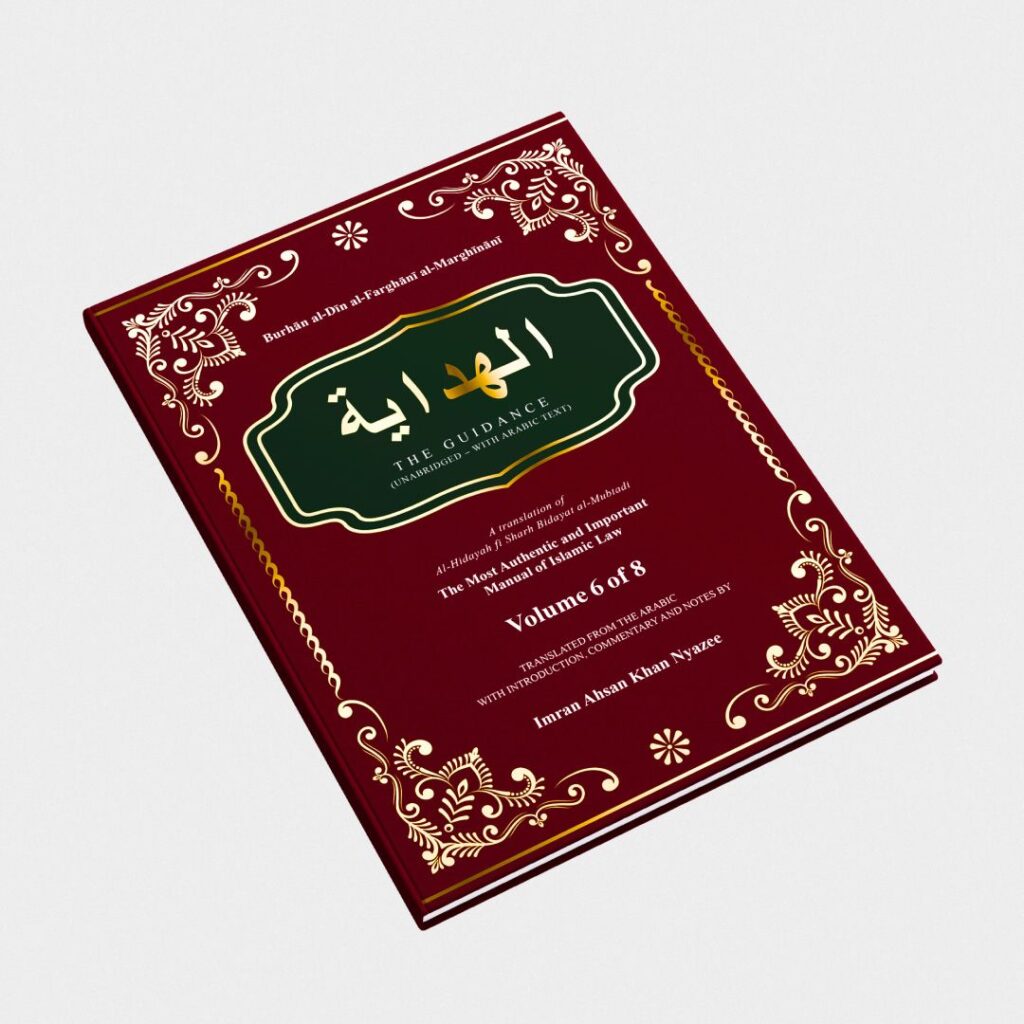
Al-Hidayah: The Guidance Hardbound Volume 6 (8 Book Series)
- by Burhan al-Din al-Farghani al-Marghinani (Author), Imran Ahsan Khan Nyazee (Translator)
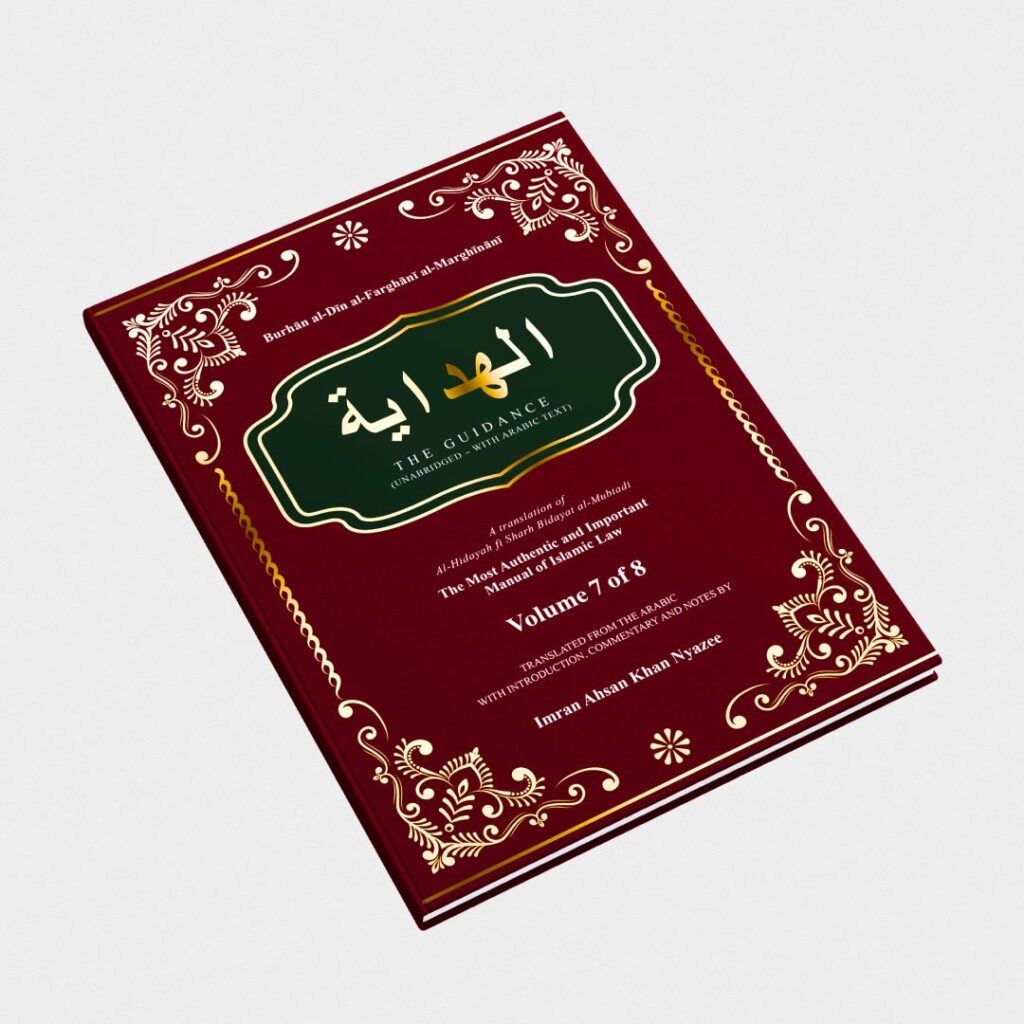
Al-Hidayah: The Guidance Hardbound Volume 7 (8 Book Series)
- by Burhan al-Din al-Farghani al-Marghinani (Author), Imran Ahsan Khan Nyazee (Translator)
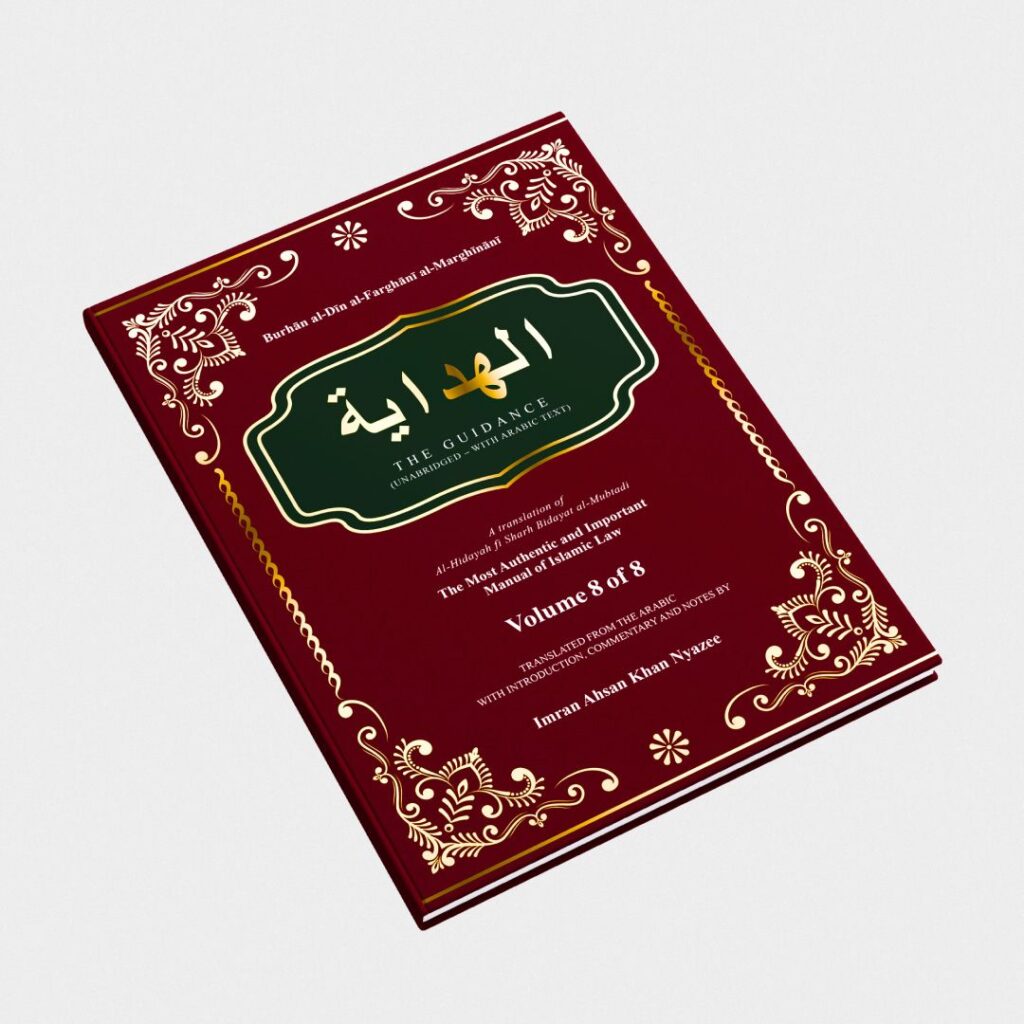
Al-Hidayah: The Guidance Hardbound Volume 8 (8 Book Series)
- by Burhan al-Din al-Farghani al-Marghinani (Author), Imran Ahsan Khan Nyazee (Translator)
Al-Hidayah: The Guidance Hardbound Volume 1 (8 Book Series)
- by Burhan al-Din al-Farghani al-Marghinani (Author), Imran Ahsan Khan Nyazee (Translator)
The first volume of Al-Hidāyah: The Guidance introduces the foundation of Islamic devotional law through detailed discussions on purification and prayer. It explains the rulings of minor and major ablution, the use of permissible water, and substitutes like dry ablution and wiping over socks. Topics such as menstruation, postnatal, and irregular bleeding are addressed with clarity, alongside the purification of impurities and proper methods of cleansing. The section on prayer outlines its timings, prerequisites, and structure, providing detailed guidance on the call to prayer, leadership in prayer, and actions that invalidate or disapprove it. It also includes procedures for prostrations of error and recitation, and covers special prayers such as night prayers, Friday and festival congregations, rain-seeking, and those offered during illness, travel, or fear. The final chapters discuss funeral rites, from bathing and shrouding the deceased to burial and rulings on martyrs. Concise and comprehensive, this volume presents the essential principles of worship with precision, making it an enduring reference for students and scholars of the Hanafi school.
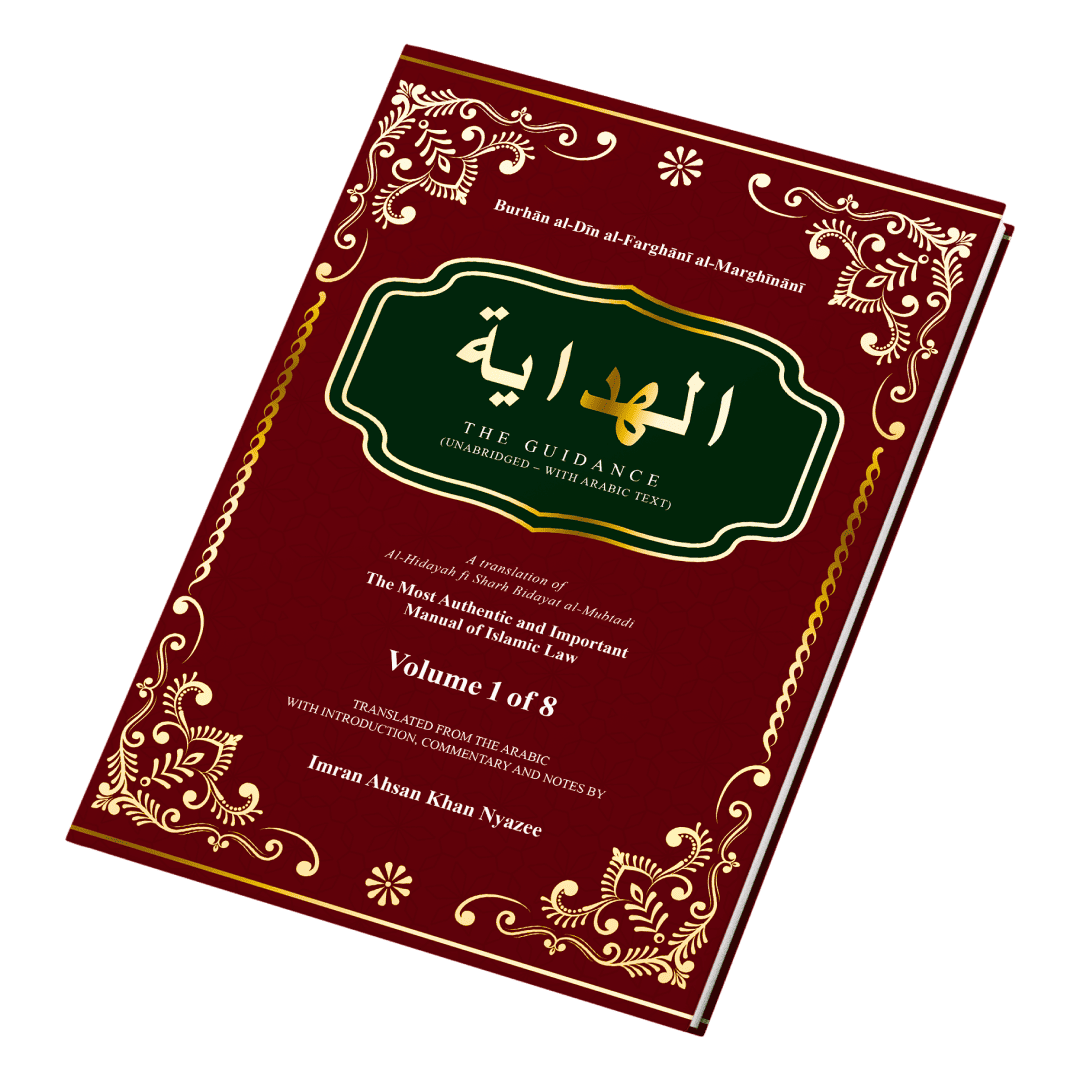
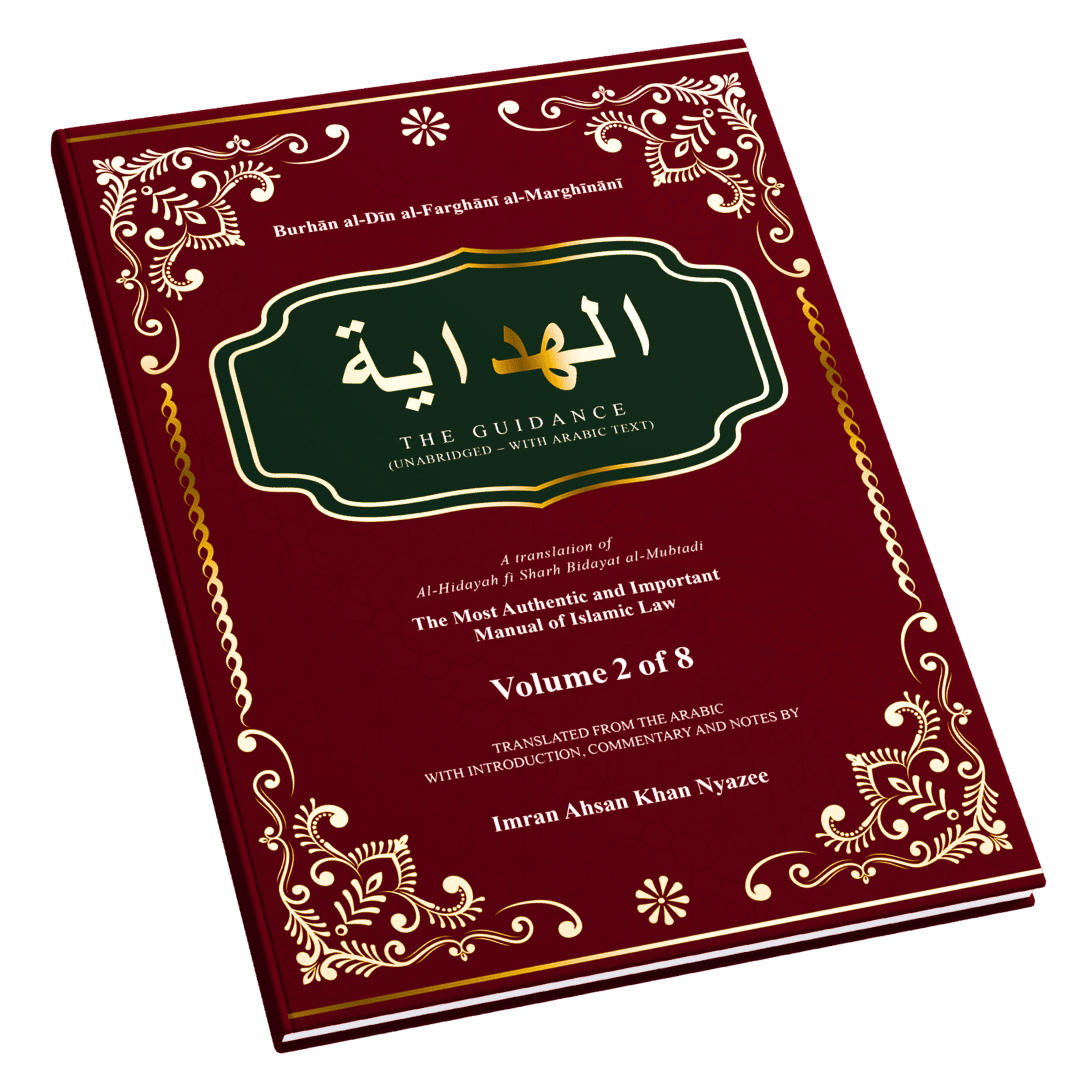
Al-Hidayah: The Guidance Hardbound Volume 2 (8 Book Series)
- by Burhan al-Din al-Farghani al-Marghinani (Author), Imran Ahsan Khan Nyazee (Translator)
The second volume of Al-Hidāyah explores three core pillars of Islamic practice—charity, fasting, and pilgrimage—each uniting social responsibility with spiritual devotion. It begins with the laws of zakat (obligatory almsgiving), explaining how wealth, livestock, crops, and minerals are evaluated for contribution, who must give, and who may receive. The section also includes charity at the end of Ramadan (sadaqat al-fitr), emphasizing its role in purification and community welfare. The part on fasting offers practical rulings for Ramadan, covering moon sighting, daily discipline, exemptions for travelers and the sick, and the rules for making up or expiating missed fasts. It also discusses spiritual retreat (ihtikaf), encouraging reflection and devotion in the final days of Ramadan. The final section on pilgrimage (Hajj) explains its obligations, sacred boundaries, and forms, along with rulings on violations, compensations, and performing Hajj on behalf of others. Concise and cohesive, this volume of Al-Hidāyah blends legal precision with moral purpose, guiding believers toward worship rooted in discipline, charity, and devotion.
Al-Hidayah: The Guidance Hardbound Volume 3 (8 Book Series)
- by Burhan al-Din al-Farghani al-Marghinani (Author), Imran Ahsan Khan Nyazee (Translator)
The third volume of Al-Hidāyah explores the principles of family and personal law in Islam, covering marriage, divorce, and emancipation with clarity and balance. It begins with the formation of the marriage contract, the conditions for validity, and the categories of prohibited unions. The text discusses the roles of guardians, equality of status, and representation in conducting a marriage, along with the rulings on dower (mahr) as a symbol of respect and obligation. Chapters on fosterage explain how milk relationships create lawful boundaries within families. The section on divorce outlines lawful methods of separation, the husband’s capacity to issue divorce, delegated and mutual forms of separation, waiting periods, and the rights of custody and maintenance for spouses, children, and parents. It also addresses cases of impotence, vows of abstinence, and oaths linked to divorce, offering both legal and ethical guidance. The final section on emancipation details the freeing of slaves, voluntarily, partially, or through wills and oaths, illustrating Islam’s gradual approach to social reform and human dignity. Concise yet comprehensive, this volume of Al-Hidāyah reflects the harmony between justice, responsibility, and compassion in the Hanafi legal tradition.
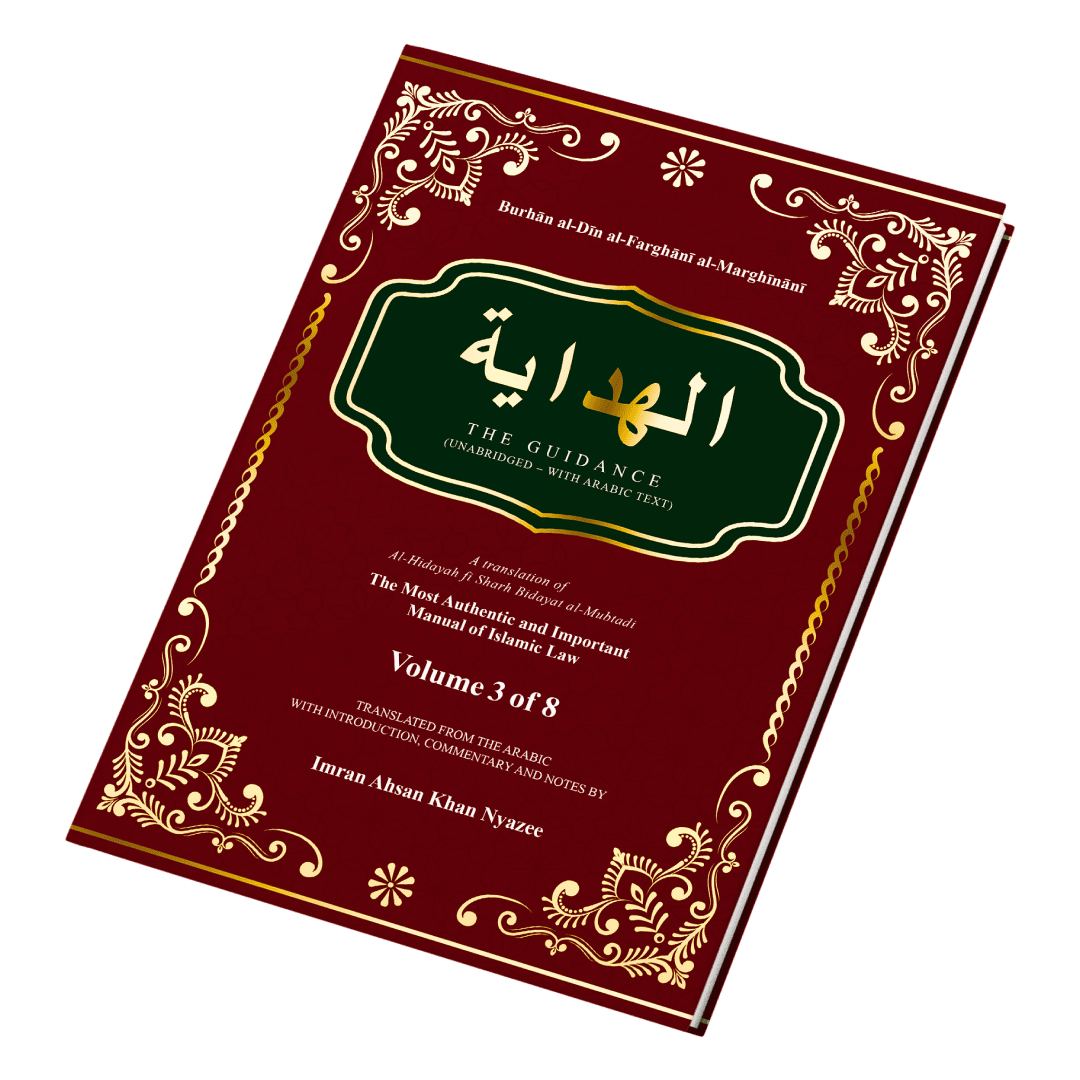
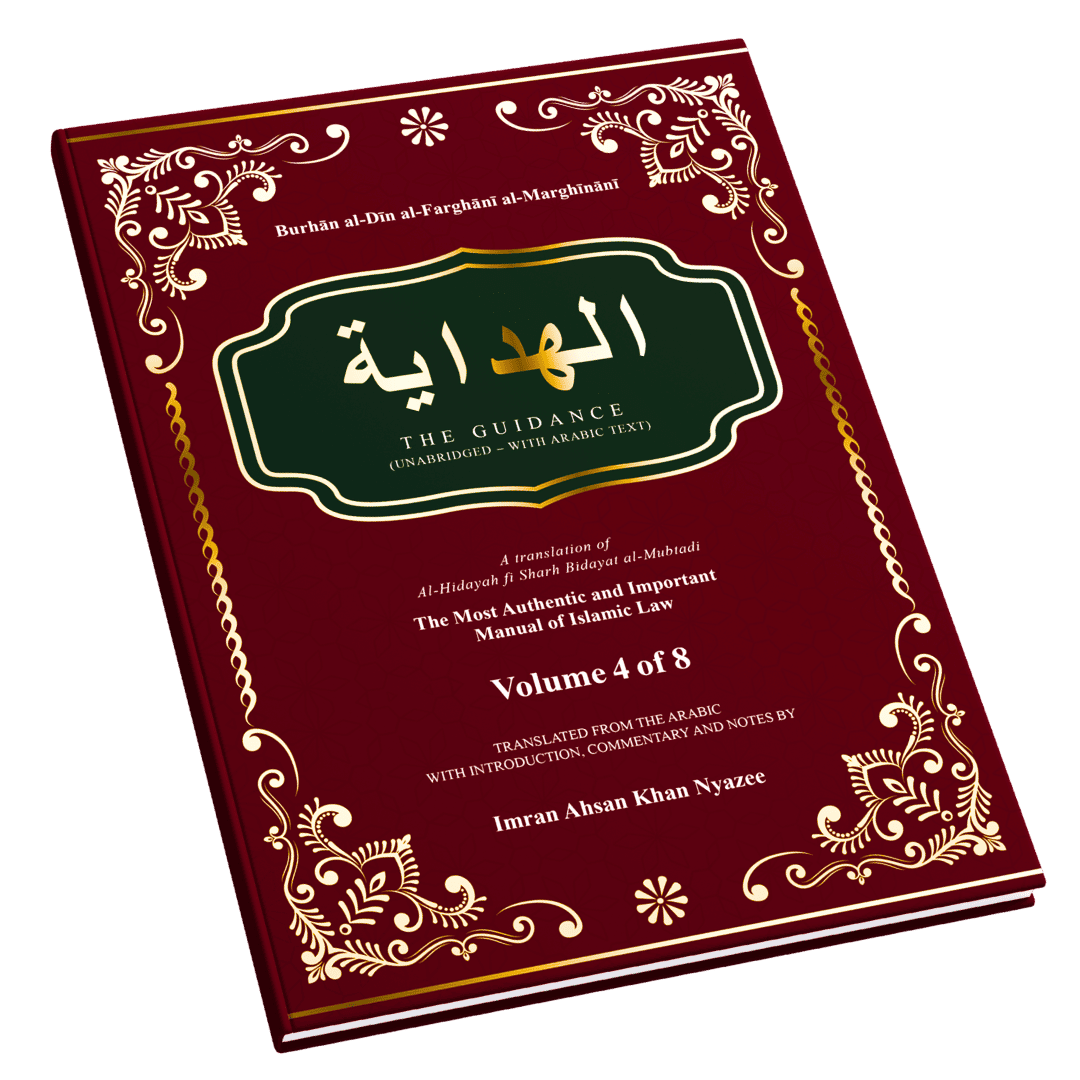
Al-Hidayah: The Guidance Hardbound Volume 4 (8 Book Series)
- by Burhan al-Din al-Farghani al-Marghinani (Author), Imran Ahsan Khan Nyazee (Translator)
The fourth volume of Al-Hidāyah outlines the legal and moral principles that shape personal conduct, justice, and community welfare. It begins with the laws of vows and oaths, distinguishing valid and invalid forms, the conditions that make them binding, and the rules of expiation for violations. These rulings extend to everyday matters such as speech, trade, and acts of worship, underscoring the moral weight of intention and words. The section on fixed penalties (hudud) explains the divine laws of punishment, evidentiary standards, and implementation for crimes like unlawful sexual relations, false accusation, and intoxication, highlighting due process and fairness. The laws of theft and highway robbery define criminal liability, safe custody, and judicial procedures, while international and public law (siyar) governs relations with non-Muslims, warfare, peace treaties, taxation, and the rights of protected communities. The following chapters address foundlings, lost property, runaway slaves, and missing persons, ensuring social responsibility and restitution. The volume concludes with partnership and charitable endowments (waqf), promoting lawful cooperation and public benefit. Concise and systematic, this volume of Al-Hidāyah captures the balance between justice, ethics, and societal harmony in the Hanafi legal tradition.
Al-Hidayah: The Guidance Hardbound Volume 5 (8 Book Series)
- by Burhan al-Din al-Farghani al-Marghinani (Author), Imran Ahsan Khan Nyazee (Translator)
The fifth volume of Al-Hidāyah outlines the economic and judicial principles of Islamic law, offering a structured framework for fair trade and justice. It begins with the laws of sale and exchange, explaining how contracts are formed, the conditions for valid trade, and the rules governing property and crops. Buyers’ and sellers’ rights are detailed through provisions for inspection, cancellation, and mutual revocation. The text addresses unenforceable transactions, cost-plus sales (murabahah), advance payments, and custom manufacturing, while emphasizing the prohibition of usury (riba) to uphold fairness and moral integrity. Chapters on currency exchange, guarantees, and debt transfer establish financial accountability and responsible dealings. Transitioning to judicial matters, the Book on the Duties of the Judge (Qadi) defines qualifications, ethics, and courtroom responsibilities, including arbitration and inheritance rulings. The closing section on testimony clarifies the rules for admissible evidence, handling conflicting statements, and penalizing perjury. Concise and authoritative, this volume of Al-Hidāyah integrates commerce, finance, and judicial ethics into a coherent guide to justice and integrity in the Hanafi tradition.
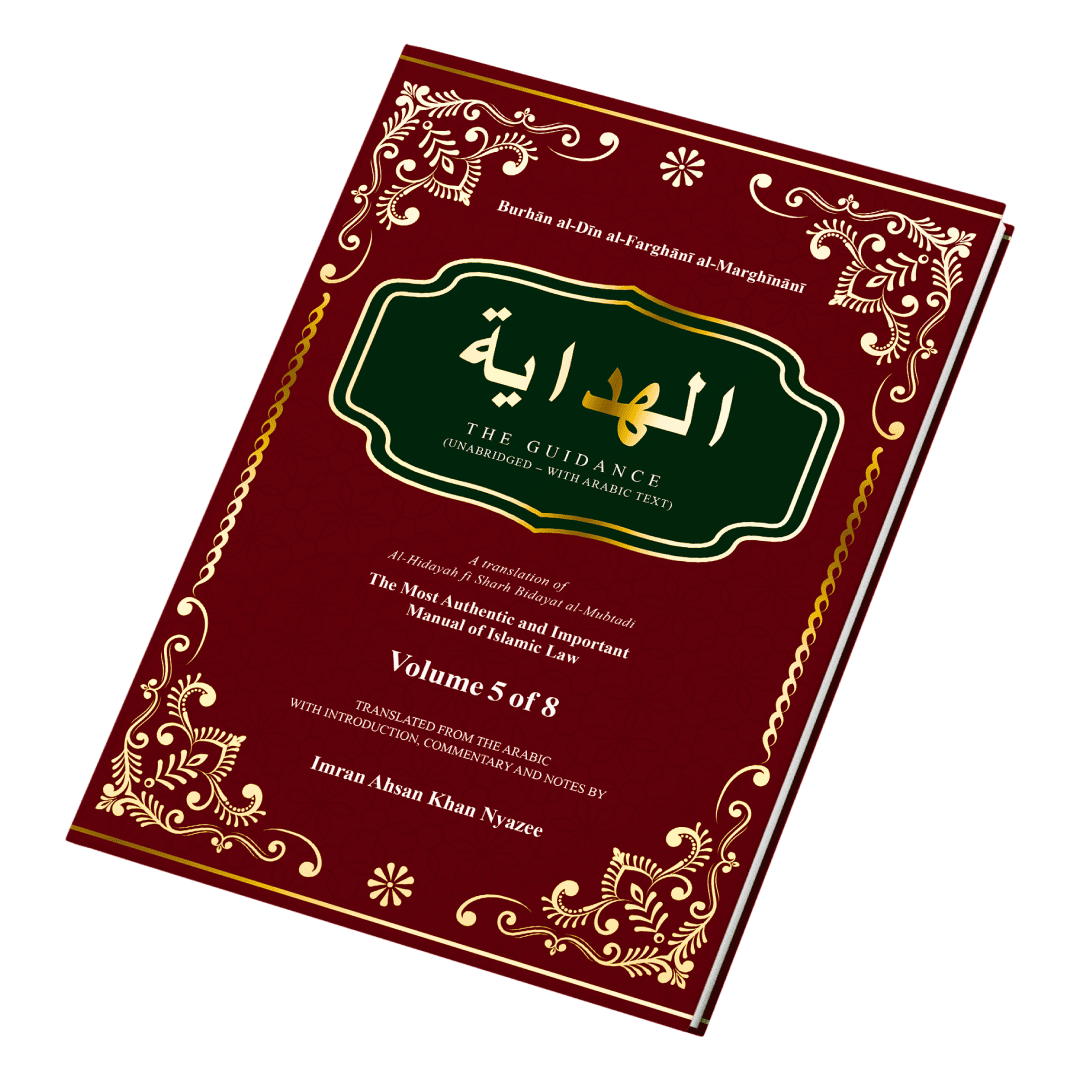
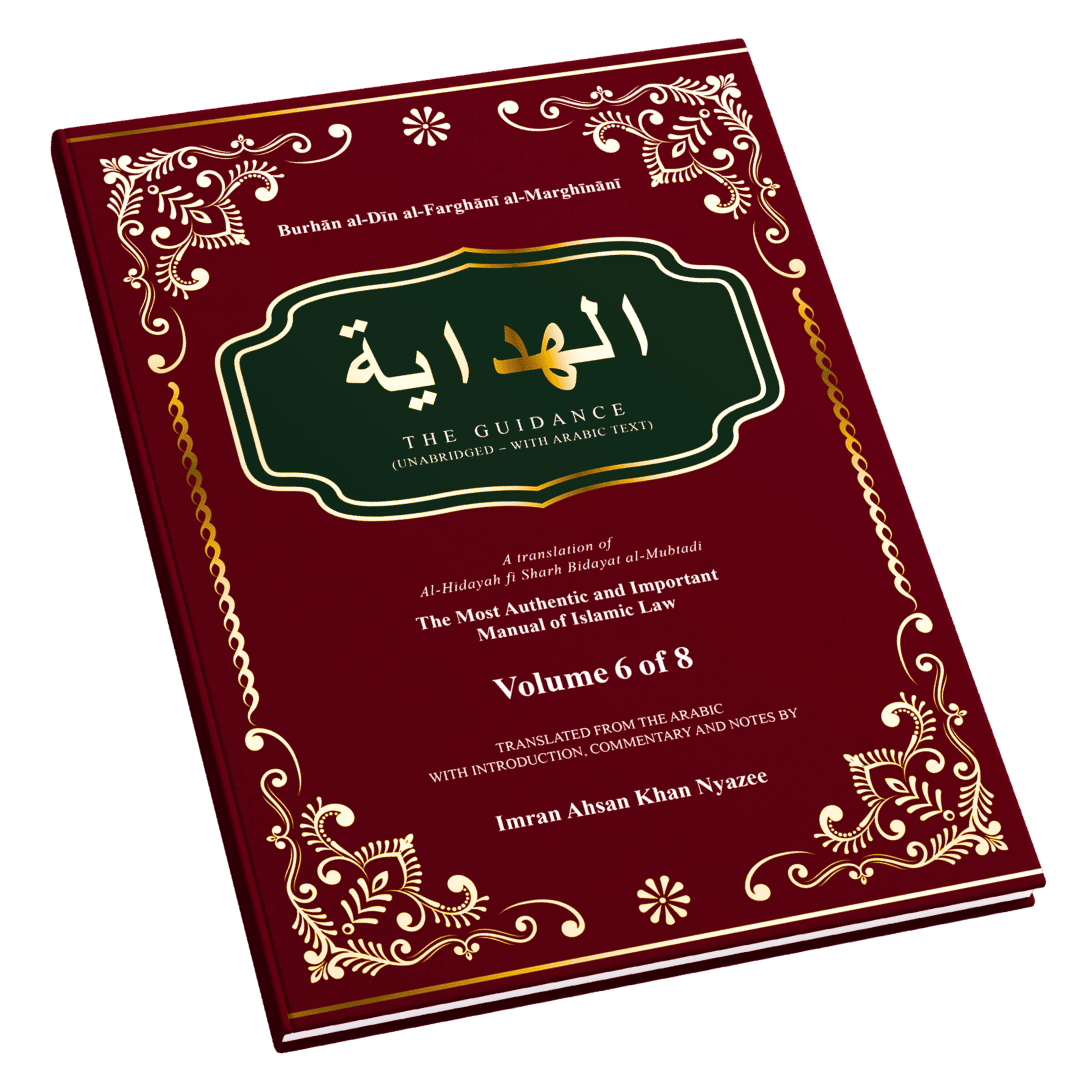
Al-Hidayah: The Guidance Hardbound Volume 6 (8 Book Series)
- by Burhan al-Din al-Farghani al-Marghinani (Author), Imran Ahsan Khan Nyazee (Translator)
The sixth volume of Al-Hidāyah examines the legal and ethical framework of transactions, partnerships, and personal agreements in Islamic law. It opens with the rules of agency, outlining how representatives act in sales, purchases, and legal matters, and the circumstances that end their authority. The section on lawsuits and claims explains court procedures, the roles of plaintiff and defendant, the use of oaths, and the resolution of ownership or paternity disputes. Acknowledgment and settlement are presented as key tools for resolving conflicts through confession and negotiated agreement. The profit-sharing partnership (mudarabah) defines fair collaboration between capital and labor, emphasizing transparency and shared responsibility. Chapters on deposits, loans, gifts, and leasing set out the rights and liabilities of both parties, addressing issues like incomplete work, retraction of gifts, and contract termination. The final section covers emancipation through written contract (kitabah), allowing a slave to earn freedom through payment. Integrating legal structure with moral balance, this volume of Al-Hidāyah illustrates how the Hanafi tradition upholds justice, trust, and fairness in all financial and social dealings.
Al-Hidayah: The Guidance Hardbound Volume 7 (8 Book Series)
- by Burhan al-Din al-Farghani al-Marghinani (Author), Imran Ahsan Khan Nyazee (Translator)
The seventh volume of Al-Hidāyah outlines the laws governing ownership, trade, and moral responsibility in society. It opens with clientage, explaining the rights between freed persons and their former masters, and proceeds to coercion and interdiction, which regulate acts performed under force and financial restrictions on minors or debtors. The chapters on authorized slaves describe the limited authority granted to conduct transactions, while usurpation and preemption define rules for wrongful possession and the priority rights of neighbors or co-owners in property sales. The law of partition ensures fair division of jointly owned property, while sharecropping and irrigation contracts set ethical guidelines for agricultural cooperation. The section on dietary laws and sacrifice distinguishes between lawful and prohibited foods, proper slaughtering methods, and the principles of moderation. The final chapters on land revival, beverages, and hunting address the responsible use of natural resources and restraint in consumption. Clear, structured, and ethically grounded, this volume of Al-Hidāyah reflects the Hanafi tradition’s emphasis on justice, fairness, and balance in economic and social life.
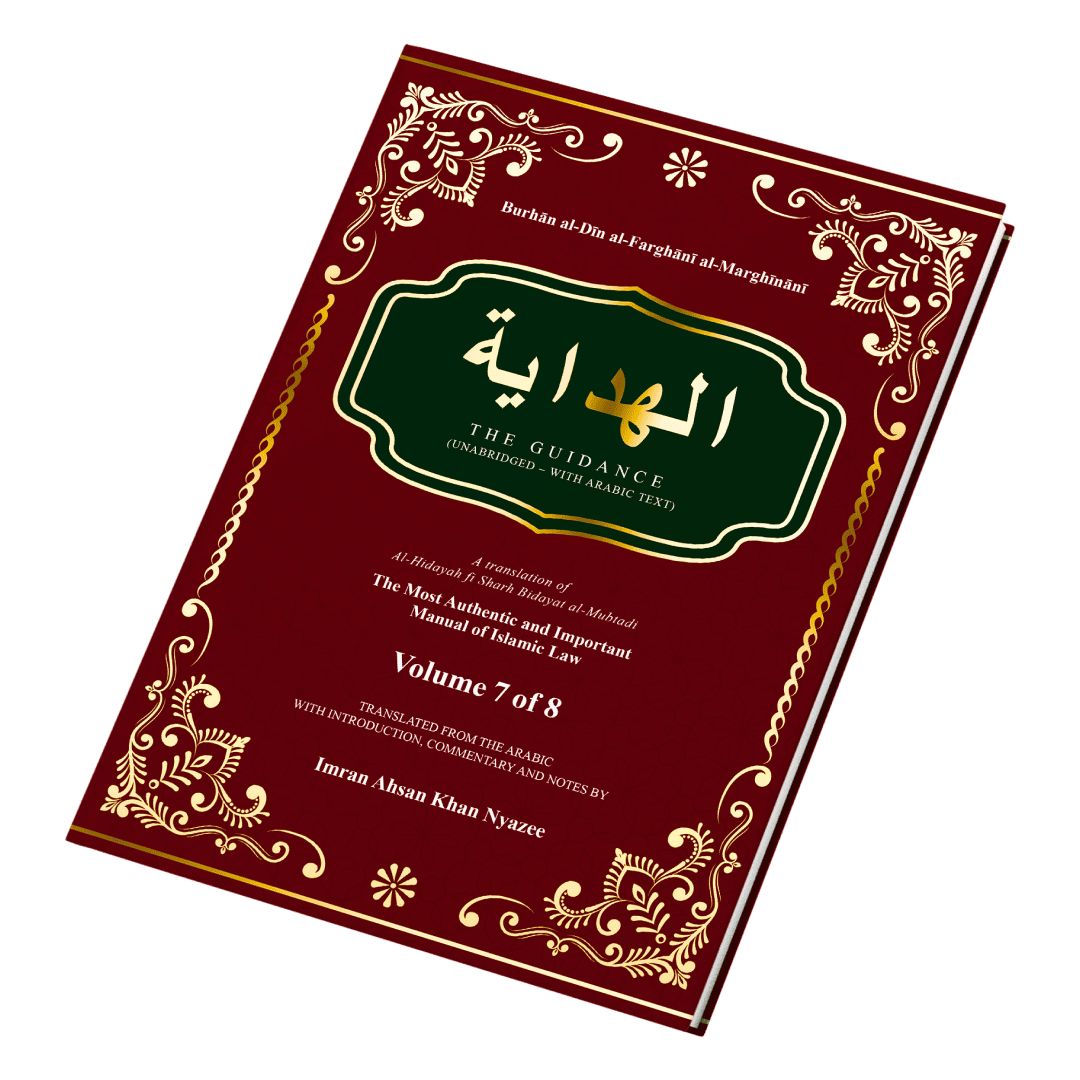
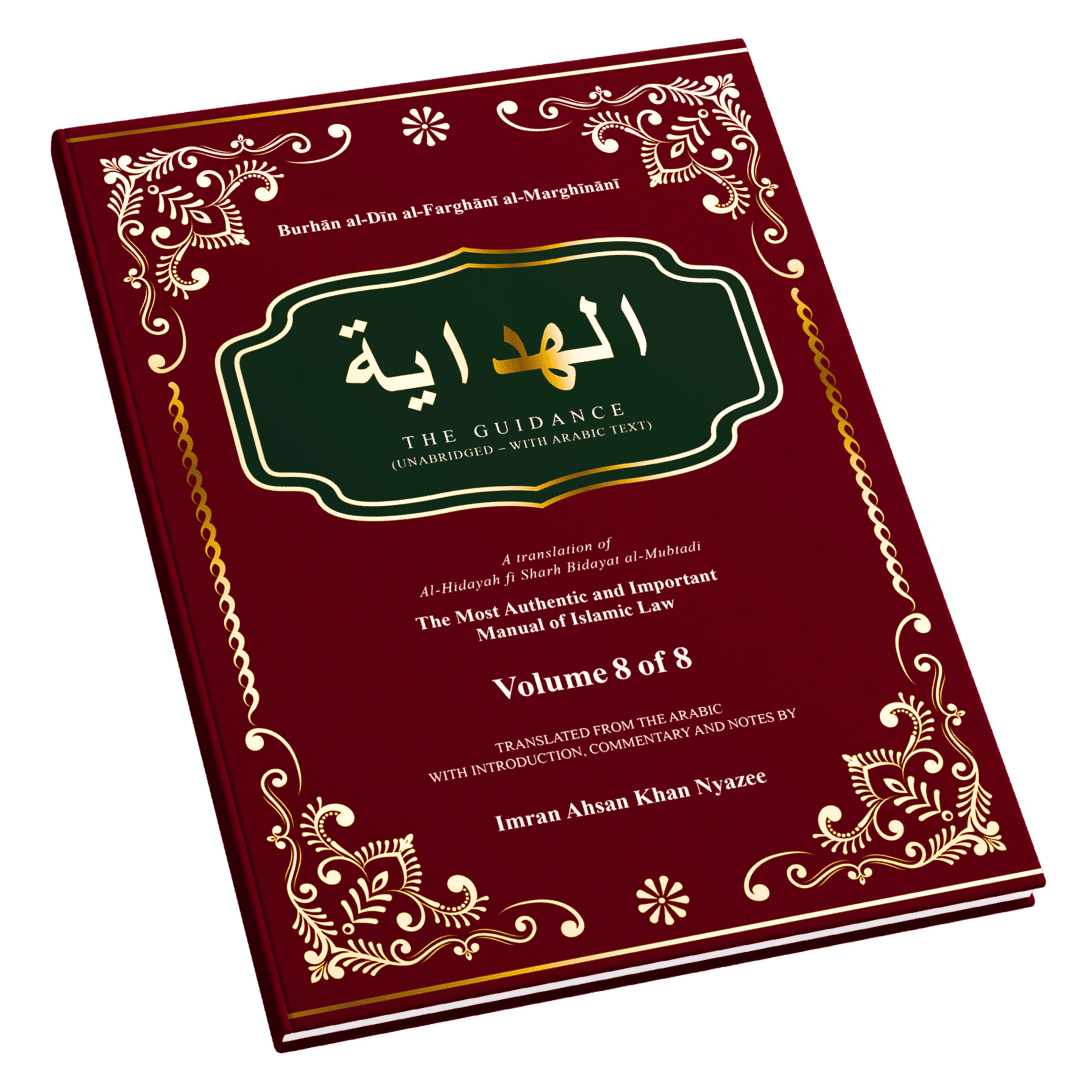
Al-Hidayah: The Guidance Hardbound Volume 8 (8 Book Series)
- by Burhan al-Din al-Farghani al-Marghinani (Author), Imran Ahsan Khan Nyazee (Translator)
The eighth and final volume of Al-Hidāyah concludes the series with rulings that safeguard property, preserve life, and ensure justice in both civil and moral matters. It begins with the laws of pledge, defining valid forms of collateral, items eligible for pledge, and the responsibilities of custodians and debtors. The text outlines how pledged assets are handled, protected, or compensated in case of loss or misuse. The section on offences and retaliation (jinayat) presents the principles of criminal liability, distinguishing between intentional and unintentional harm, and explaining the application of retaliation (qisas) and negotiated settlements. This is followed by detailed rulings on blood money (diyah) for cases of homicide, injury, or miscarriage, extending to damages involving property, animals, and slaves. The volume then discusses bequests (wasaya), setting limits on what can be willed, the one-third inheritance rule, and the responsibilities of executors in managing estates. It also includes rulings on emancipation during illness, bequests by non-Muslims, and bequests tied to service or property use. The closing chapters address ambiguous gender cases (khuntha) and miscellaneous legal issues, highlighting the jurists’ commitment to justice, equity, and compassion. Bringing together civil, criminal, and ethical law, this final volume of Al-Hidāyah serves as a comprehensive conclusion to the Hanafi legal tradition.
Customer Reviews
Great book, great quality and ease of use. printing is excellent and very crisp. would recommend!
All Book Collections
Dive deep into the principles of Islamic law, including the methodology of interpretation, schools of thought, and application in modern times. Perfect for students, scholars, and anyone seeking clarity in Shari‘ah-based legal reasoning.
